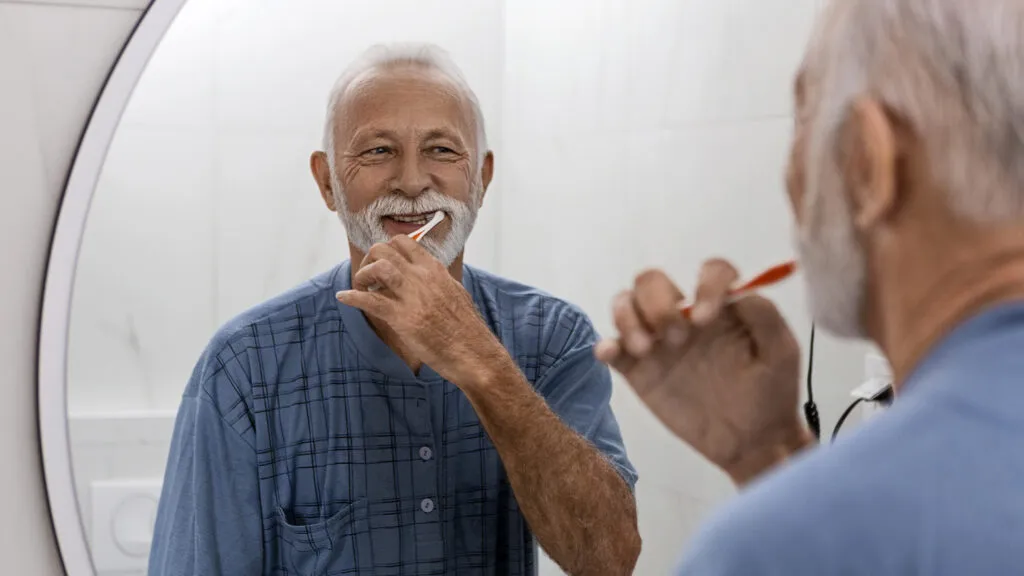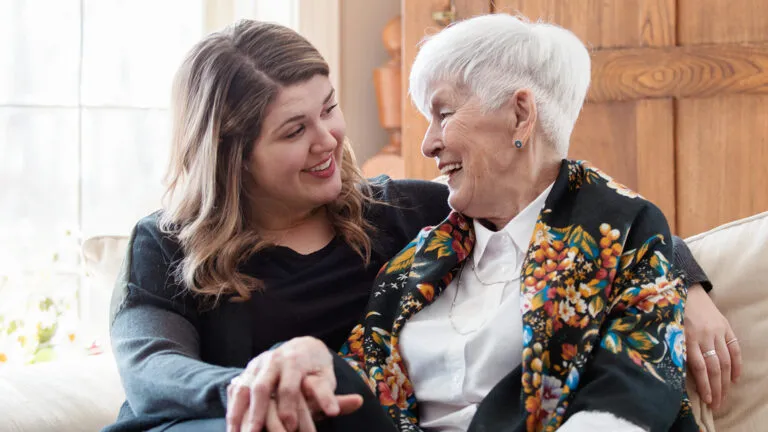Brush, floss and see the dentist. Protecting your teeth and gums is a relatively simple process—until it’s not.
Life can get in the way of self-care. Older adults, for example, can face serious challenges when it comes to dental hygiene. This is especially true for someone with a disability or a chronic condition like Alzheimer’s disease. So, it’s critical for you as a caregiver to do what you can to make sure your older loved one maintains oral health. Inadequate dental hygiene has been linked to heart disease, stroke and osteoporosis and, on a more basic level, can affect your loved one’s ability to eat or talk.
General concerns for adults over 60 include a second round of cavity-prone years—largely due to medications that can cause dry mouth—as well as increased risk of gum disease and oral cancer, according to the American Dental Association (ADA).
Dental patients with certain heart conditions can also be at risk of bacteremia, which means that bacteria can enter the blood stream after dental procedures. And when someone is confined to bed, bacteria due to poor mouth care can be inhaled into the lungs and cause pneumonia. People with dementia face their own unique dental care challenges, as they can forget how to brush and floss, or why it matters, and can have difficulty carrying out these actions by themselves. The good news is that vigilant caregivers can do much to combat each of these issues.
It’s important to get your loved one to the dentist for regular check-ups and to prevent or address these potential issues:
- Dry mouth. A side effect of more than 500 medications, dry mouth is a common cause of cavities in older adults and can also lead to ulcers and sores. These medications include many for high blood pressure, high cholesterol, pain, anxiety, depression, Alzheimer’s and Parkinson’s diseases. If your loved one has dry mouth symptoms, a dentist may use a gel or varnish to help stave off cavities or recommend an over-the-counter oral moisturizing spray or mouthwash. You can also help your loved one by seeing to it that he or she drinks more water and avoids food and drinks like coffee, alcohol, fruit juices and carbonated soft drinks, as they can irritate a dry mouth. You may also consider speaking with your loved one’s doctor about possibly changing medication dosages.
- Oral cancer. Regular dental visits are important so that your loved one can get checked for oral cancer. The average age of most people diagnosed with these cancers is 62. Early detection can be life-saving since oral cancer typically doesn’t cause pain in its early stages.
- Periodontal disease. As with oral cancer, periodontal disease typically does not cause pain until it has advanced. At that point, it can destroy gums, bone and ligaments and cause tooth loss. This disease is caused by bacteria in plaque, which can irritate the gums. It can be treated or prevented completely with regular dental or periodontal appointments.
- Abscessed or broken teeth. An abscess is a painful infection inside the tooth which can spread quickly to the gums. If broken teeth are ignored, they can cause serious infections in the mouth.
- Antibiotic prophylaxis. For a small number of people with specific heart conditions, antibiotics are recommended before certain dental procedures. This is known as “antibiotic prophylaxis.” The concern is that bacteria from the mouth can enter the bloodstream, causing infection in other parts of the body. For specific guidelines from the ADA, go to https://www.mouthhealthy.org/en/az-topics/a/premedication-or-antibiotics.
Maintaining proper dental care can be far trickier, of course, if your loved one has dementia. Someone in the middle and late stages of Alzheimer’s may not remember how to use toothpaste or rinse and may resist help doing so. Nevertheless, there are a number of things you can do to ease the experience for your loved one. An in-home health care aide could also provide valuable assistance, if you feel you can’t go it alone. They are trained to meet the needs of people with specific conditions such as dementia, or people who are disabled and/or confined to bed. An in-home aide or healthcare professional can offer soothing guidance and carefully maneuver your loved one in order to prevent injury.
The following dental care tips may help if your loved one has dementia:
- Choose the right place and time. If the bathroom is difficult for both of you to maneuver in, sit your loved one in a comfortable chair and try using the kitchen sink or a basin on a table. It might also work better for you to sit or stand behind your loved one as you go through the teeth cleaning routine. If your loved one is resistant, don’t force his or her mouth open. You may have to wait until a calmer time, if he or she is agitated, but make sure the last brushing follows dinner or any liquid medication taken in the evening.
- Break down and demonstrate steps. If your loved one is able to understand easy directions, break down the actions into small steps by saying , “Hold your toothbrush,” and “put the toothpaste on the brush,” etc. If he or she needs more help, put the paste on the brush and model the up-and-down brushing movement or put your hand on his or hers and gently guide the movement. Take care to to clean the teeth, gums, tongue and roof of the mouth twice daily. A soft-bristled children’s toothbrush is preferable, and a long-handled or angled brush can be easier for your love done to handle. You might even try putting the handle through a tennis ball for something bigger to hold onto. Rinsing with an antimicrobial mouthwash can also be helpful, but be careful to make sure your loved one doesn’t swallow it.
- Remember to floss. Daily flossing is important. Do it gently, using a floss holder, but if that’s too distressing to your loved one, a Proxabrush handle and brush system can also help to clean between teeth.
- Pay attention to signs of mouth pain or bad breath. If your loved one won’t eat at mealtimes or appears strained while eating, it can be a sign of a dental problem. Other signs include rubbing or touching the cheek or jaw, shouting out or moaning, and flinching, especially when washing the face or being shaved. Make sure to get your loved one to the dentist if any of these things are occurring. Causes of bad breath include dry mouth, medications and certain foods, but it can also signal an infection.
- Denture care. If your loved one wears dentures, rinse them with plain water after meals and brush them each day. Take them out every night and soak them in a cleanser or mouthwash. While they are out, try to brush your loved one’s gums, tongue and roof of the mouth with a soft-bristled toothbrush or gauze. Ask the dentist to check the dentures checked regularly.
Your local dental society can provide you with names of dentists experienced in working with people who have dementia or disabilities. For additional information, check out the Special Care Dentistry Association’s referral directory. The University of California San Francisco Weill Institute for Neurosciences Memory and Aging Center also offers a useful video on Helping with Dental Hygiene.





